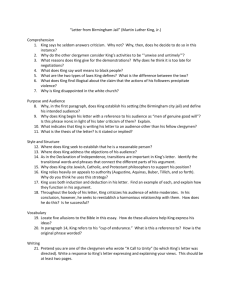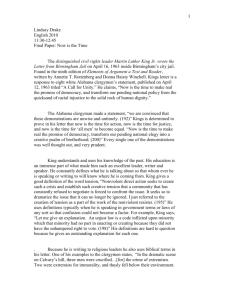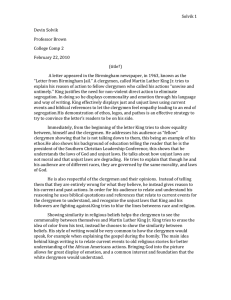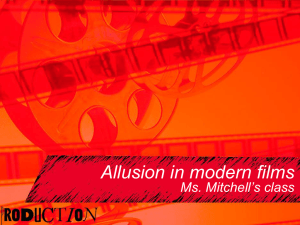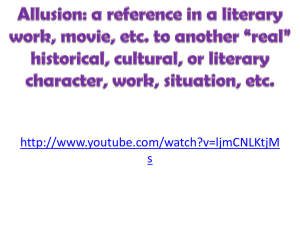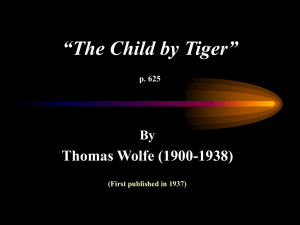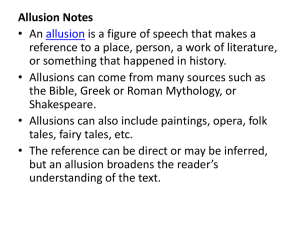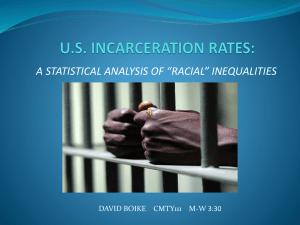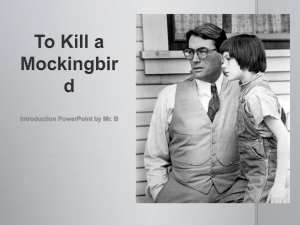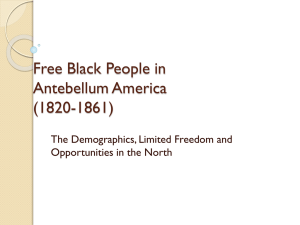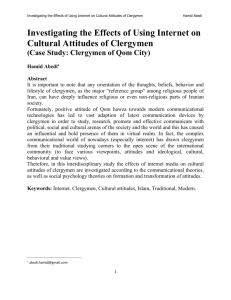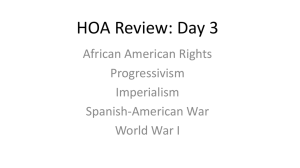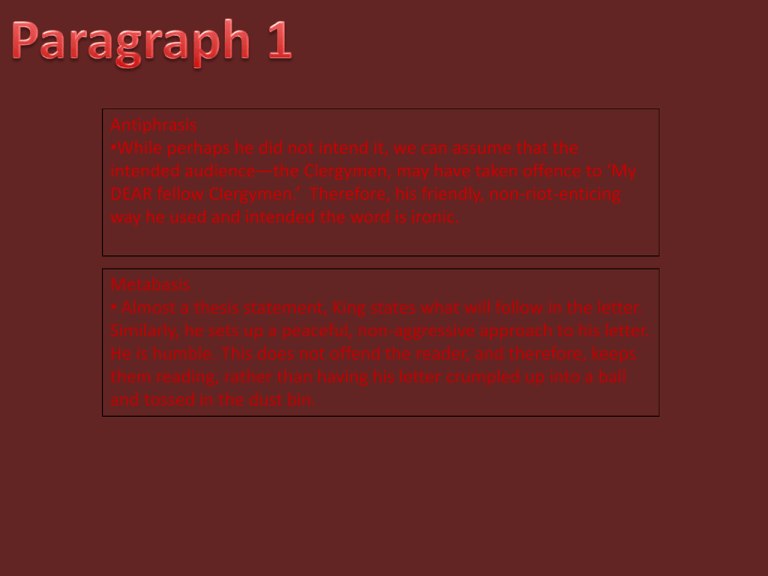
Antiphrasis
•While perhaps he did not intend it, we can assume that the
intended audience—the Clergymen, may have taken offence to ‘My
DEAR fellow Clergymen.’ Therefore, his friendly, non-riot-enticing
way he used and intended the word is ironic.
Metabasis
• Almost a thesis statement, King states what will follow in the letter.
Similarly, he sets up a peaceful, non-aggressive approach to his letter.
He is humble. This does not offend the reader, and therefore, keeps
them reading, rather than having his letter crumpled up into a ball
and tossed in the dust bin.
Anadiplosis
Here, he is clearly
refuting the
Clergymen’s letter, by
stating that he is not
an outsider. He places
these words close
together not only to
say why he is here,
but that he is.
Conduplicatio
• Reiterates the fact that he is
here with a reason; King did not
simply show up in Birmingham
with no initiation.
Historical Perspective
• King is arguing against the
Clergymen’s accusations of him as
an outsider. He explains that his
organization may be
headquartered in Atlanta, but his
reach extends to the entire South.
King wanted the fair treatment of
Blacks across the country,
particularly in the South, for
everyone—not just Atlanta.
I don’t really know either.
Allusion
•King uses an reference to the prophets of
the 8th century B.C., and the Apostle Paul
because 1) he knows that the Clergymen
(should) know what he’s talking about,
and 2) it’s a very very similar story to his
own.
Historical Perspective
• As he was locked in a jail, Black, and not much loved
amoung the white community, the only reference King
had… was his own. To be able to remember names, dates,
stories, all at the drop of a hat, it really shows not only
how brilliant King was, but also his devotion to his faith.
Antithesis
• By juxtaposing Injustice and
justice, not only is he emphasizing
the word ‘justice’, one that he will
use throughout his letter, but he
also implies that the Clergymen are
not doing enough.
Epanalepsis
•
Understatement
• By understating what he believes the
Clergymen feel, he removes the arrogance from
a statement, the implied incrimination, and of
course, the crumpling and tossing of the letter
before it is ever read.
Distinctio
• King clearly states the steps that his nonviolent
campaigns go through—this adds emphasis to the
legitimacy of the campaign and also shows the nonviolent-ness of the campaign. That is to say, he isn’t
teaching his followers to burn and pillage.
Historical Perspective
• Fortunate or unfortunate, King and his
followers were not the only ones fighting for the
freedom and fair treatment of Blacks in
America. Some groups, such as the followers of
Malcolm X, were violent extremists. And, just as
one might expect, violence was rather frowned
upon, giving other, non-violent groups a bad
name.
Anaphora
•King explains that he asked his
followers if they would be able to
withstand humiliation without loosing
their pride. The repeated use of ‘Are
you…’ adds emphasis to the extent of
the work that had to be put into this
ordeal.
Rhetorical Question
• In context, these questions were to be
asked and answered by someone other
than the reader. However, King is also
asking the Clergymen—could you do the
things that these people have done?
Could you stand up and not fall down?
Historical Perspective
• It wasn’t easy to march in a non-violent
protest. It was easier to partake in a violent
rebellion—at least you could fight back. Law
enforcement always seemed to think that
petitioners could, at any moment, get
violent. They sprayed people with fire hoses,
beat them with Billy clubs, arrested them,
assulted them, and any number of other
horrible things to them. It took real pride to
not fight back.
Hydrophora
King asks his audience, ‘Why direct
action? ‘ and he proceeds to explain
why this course of action was needed in
his entire letter. He needed to explain to
the clergymen that they were not right
by a divine order—they were simply
ignorant.
Parataxis
• Adding the ‘and’ adds a sense of
continuity; like it all happened at
the same time, in a sequence.
Historical Perspective
• Eugene ‘Bull’ Connor was and anti-Black,
anti-union white supremacist with little
tolerance for protesters. He had King’s
protesters sprayed with firehoses, dogs
attack them, and generally the Law
Enforcement beat the people. However, it
backfired, and the nation-wide news
coveragehelp shift the public opinion of
Civil Rights.
Procatelipsis
• King asks his audience the questions he assumes they have
been asking, repeating the very important word, ‘Why?’. Not
only is this word the nightmare of parents everywhere, the basis
of science as we know it today, and the overwhelming and
burning question we all seem to be asking Tiger Woods, but it is
also the drive behind King’s push. Why.
Antithesis
• By juxtaposing monologue and dialogue, he
emphasizes his desire to negotiate with the
white society and come to an agreement.
Historical Perspective
• King was an intellectual; a man of words (as so aptly shown by this
letter). He did not feel like he needed to use violence to be heard,
unlike some of his counterparts. He wants to create ‘tension’ in
hopes that he will be able to be heard because of that, because
without a reason to, the whites would not listen.
Epithet
• King starts to paint a beautiful
scene of a church (which they
should be able to picture) in
Alabama (which he has been
referring to it as ugly) in order to
prove that he believes justice,
peace, and full Christianity can be
fostered here, in this… not-so
wretched state.
Expletive
•It really shows that 1
single, 4-letter word
can kill the hopes and
dreams of millions.
Antithesis
• King juxtaposes
delayed and denied,
making a very strong
statement: you are
breaking both the
law of the
constitution but also
going against your
faith.
Expletive
•It draws
attention to his
blunt honesty.
Onomatopoeia
• The use of the word ‘rings’ implies that it
is sharp; piercing. It is a stronger word and
adds emphasis.
Antithesis
•He juxtaposes ‘oppressor’ and
‘oppressed’ not only to establish
the difference between them, but
to use powerful, historical words to
emphasize his point. Blacks are
oppressed now—what difference is
that for a synonym of oppressed—
slaves?
Historical Perspective
• Albert Boutwell was
seen as a moderate. His
election, some would
say, was a response to
Bull Connor’s more
extreme racism and
anti-Civil Rights
legislation. King is right
in stating that Boutwell
might be better for his
cause, but it would be
better had blacks been
able to vote.
Anaphora
• The general population of whites, particularly the
segregationists, would simply advert their eyes to the
affects of what ‘separate but equal’ really meant. King
effectively uses pathos here to demonstrate why he did
what he did, why he was doing what he was doing, why he
was fighting for this cause.
Alliteration
•This not only draws
attention to the phrase,
but it also adds the
slightest irony—your
tongue may twist and you
may stammer over the
repitition.
Allusion
•King alludes to St.
Augustine, someone the
Clergymen should know,
revere, and never doubt
his word. It brings
authority to his argument.
Scesis Onomaton
•Not only does it stretch out the phrase,
the idea, but it also, literally, makes it seem
longer—not only by day, but by night.
Polysyndeton
•By using a number of ands, it is almost
like an addition sign. Not only but this
happen, but ADD this AND this AND this.
Asyndeton
•By never using a conjunction
between phrases, it doesn’t allude
to an end until the final period.
This makes the list of atrocities
seem never-ending.
Antithesis
•By juxtaposing just and unjust,
not only does it clearly say what
he means, but it also leaves no
room for anything else—no room
law laws that might be just, or just
to some people.
Epistrophe
•After the end of a monster
Sentence, using the same word as
the end of the previous sentence
reminds the reader what he was
explaining.
Epistrophe
• ‘just laws’ is extremely important
to him—its what he’s fighting for–
and he emphasizes how important
they are to society. For
segragationalists, laws only had to
be just for themselves, but if it was
Unjust to someone else, it obviously
makes the whole thing unjust, right?
Enumeratio
• By listing a long number of
things, but always starting with
the same phrase, Kings
emphasizes not only what he and
his people go through, but also
the fact that the Clergymen really
have no idea what he goes
through every day.
Historical Perspective
• legal segragation started with the
Supreme Court’s decision on Plessy vs.
Ferguson, claiming that ‘separate but equal’
(not those exact words) was constitutional.
However, like many things, this also had an
affect on the people of America and their
mindset. Because… no one was enforcing
separate-but-equal laws. And the lack of
equality brought around just that.
Hypophora
• King emphasizes throughout his
entire letter the difference
between justice and injustice.
Here, he asks the question of his
audience, and then proceeds to
define it in a way that the
audience has to agree.
Historical Perspective
• King mentions how his people were being
brought down to the status of objects.
They, to the whites, weren’t ‘people,’ but
might as well have been any large object in
their way. Useful, perhaps, when physical
labour needed to be done, but useless
otherwise. Objects could be property. And
under U.S. law before the Civil War, slaves
were property. Just because the US
government had slapped the label of
freedom on the blacks, it doesn’t mean that
anything was different at all.
Anadiplosis
In this case, King uses the
phrase ‘unjust law’ not only
to make it very clear what he
is talking about, but to also
encourage the negative
connotation of ‘unjust.’
Historical Perspective
• Poll Taxes. Grandfather Clauses had been
outlawed, but a poll tax could be charged
to anyone so that they could vote. Not only
was this offensive, but some couldn’t pay
it—segregation was not just on a political
level, but an economic level as well. Wellpaying jobs were hard to come by, and if it
came down to feeding your family or
voting… the choice is rather clear.
Simile
He uses the simile of a boil to imply
the nastiness of the subject— Unjust
laws. Segregation. Similarly, it will
only be cured when it is brought to
light and lanced off.
Allusion
• He references Socrates, and his death. Socrates
drank the hemlock and died, even if he was
given the chance to leave. He implies that he,
and possible his people, are willing to die for
their cause—much like the American Revolution.
This is a very powerful allusion that one can
draw many conclusions from.
Allusion
• Again, King uses Jesus as a reference, the one
man that the Clergymen ought to be familiar
with. It reminds the audience (The Clergymen)
that King is on the same plane as them—he is
just as learned as they are—and it also
reminds them of the divine sovereignty. King is
not preaching to them, he is justifying his
argument.
Historical Perspective
• Groups like the
Black Panthers and
the followers of
Malcolm X had, unlike
King, a string sense of
Pride that extended
beyond the belief in
equality—they saw
themselves as better,
and would show this
in violent displays. No
bueno.
Hyperbole
• King enphasizes the fact that
Blacks aren’t going to simply
stand in the shadows without
freedoms. Millions might not
convert themselves to violence,
but certainly thousands, and
that could potentially kill.
Aporia
• By saying that he might have
expected too much, he draws
attention to the fact that it really
wouldn’t be that big a deal for
the whites. That, for them, it
really would be a simple thing.
Fish.
Historical perspective
• It was a paradox. The whites
wouldn’t do anything about it. The
black had no say—no vote—to place
a black into a position of power,
where he could make reforms. Who
would listen to them? They needed
the backing of the voters. They
needed some whites.
King hits on a a group that Nixon will
refer to in later years– the silent
majority. The ‘average Joes’ that go
about their daily lives, not as
extremists on wither sides. To the
cause of Civil Rights, they were, for
the most part, apathetic toward it.
Maybe it would happen. Maybe it
wouldn’t. But they had the power to
change things.
Expletive
• By interjecting the word
‘oh!’ into his sentence, he
adds a real sense of
exasperation and anguish. It
is much more powerful than
a simple sentence.
Historical Perspective
• Some segregationists used religion
to back their arguments. Here, King
points out that he too is a man of
God, and that Christ himself would
not have wanted what was
happening—this is the opposite
statement of what the
segregationists would say.
Chiasmus
• The reversal of the grammatical
structure separates the two parts
of the sentence, emphasizing the
difference in time periods, but
also bringing attention to how
similar they are.
Allusion
• He refers to the Pilgrims, the
seekers of religious freedom—who
the Clergymen should be able to
relate too– who are generally
considered to be the first people to
arrive by 5th graders across the
country. It is the first this children
study in history class.
Epistrophe
• King uses ‘We were here’ at the end of
two consecutive clauses to reiterate the
fact that the blacks were, of course, a
apart of America for just as long as the
whites. It does it better than had he
changed the wording because it provides
continuity in the sentences.
Anaphora
• Using the word ‘before’ at the
beginning of the sentences adds a
continuity—it re-iterates a point by
making it additive, rather than two
separate statements.
Historical Perspective
• Before the Civil War, and
for a little bit afterward,
slavery was needed in the
South, because that was on
which the Southerners had
based their economy. So
really, Blacks kept the
South alive, not the rich
whites.
Allusion
•King Alludes to the
Declaration of
Independence—the
document that
supposedly freed the
country from all
oppression. It’s a bit of
a slap in the face.

